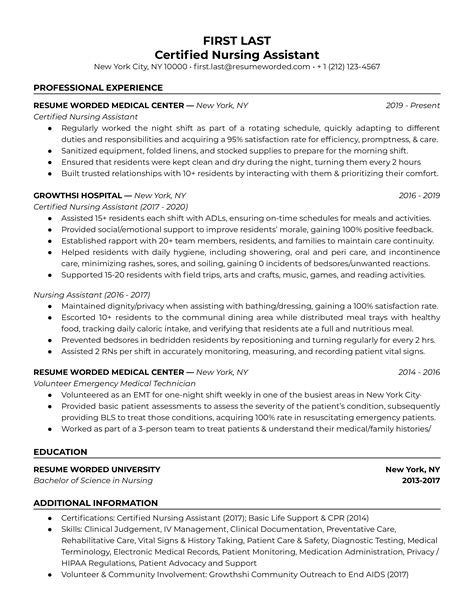Craft a standout CNA resume with our helpful template, key skills, sample work experience, and essential education and certifications. Land your dream job today.Are you a Certified Nursing Assistant (CNA) looking to land your dream job? Crafting the perfect resume is a crucial step in standing out to potential employers. In this blog post, we will guide you through the process of creating an impressive resume that highlights your skills, work experience, and education as a CNA. From a comprehensive resume template to key skills that can make your resume shine, we’ve got you covered. We’ll also provide you with sample work experiences that employers love to see and give you expert guidance on listing your education and certifications to showcase your qualifications. With our helpful tips and examples, you’ll be well on your way to landing the CNA position you’ve been aspiring for. So, let’s dive in and create a standout resume that will impress any hiring manager in the healthcare industry.
CNA Resume Template
Are you a certified nursing assistant (CNA) looking to create a standout resume that highlights your skills and experience? Crafting a well-structured CNA resume is essential in landing your dream job in the healthcare industry. A well-designed resume template can help you showcase your qualifications and impress potential employers. Let’s explore the key components of a CNA resume template that can help you stand out in the competitive job market.
First and foremost, your CNA resume should include a clear and concise summary of your professional background and objectives. This section, often referred to as the ‘Career Objective,’ should provide a brief overview of your experience, skills, and career goals. Use this opportunity to emphasize your dedication to providing high-quality patient care and highlight any specialized areas of expertise, such as experience working with elderly patients or individuals with specific medical conditions.
Additionally, your CNA resume template should feature a comprehensive list of your key skills and qualifications. This section serves as a valuable opportunity to highlight your proficiency in essential nursing tasks, such as patient monitoring, medication administration, wound care, and vital sign assessment. Utilize bold text to draw attention to critical skills, such as CPR certification, infection control, and effective communication with patients and healthcare team members. Including specific examples of how you’ve applied these skills in previous roles can further demonstrate your capabilities to potential employers.
Key Skills for CNA Resumes
In order to create a compelling CNA resume, it’s essential to highlight your key skills that make you a valuable candidate for the position. One of the most important skills for CNAs is communication, as they must effectively communicate with patients, their families, and other healthcare professionals. Additionally, empathy is a crucial skill for CNAs, as they often work with individuals who are in vulnerable and sensitive situations. Another vital skill for CNAs is attention to detail, as they are responsible for monitoring and recording vital signs, symptoms, and any changes in a patient’s condition.
Furthermore, time management is a key skill for CNAs, as they must prioritize tasks and manage their time effectively to provide quality care to multiple patients. Teamwork is also an essential skill, as CNAs often work alongside other healthcare professionals to ensure the well-being of their patients. Lastly, adaptability is an important skill for CNAs, as they must be able to quickly adjust to changes in their work environment and patient needs.
When crafting your CNA resume, be sure to showcase these key skills in your resume summary, skills section, and throughout your work experience descriptions. Highlighting these skills will demonstrate to potential employers that you possess the necessary qualities to excel in the role of a certified nursing assistant.
Sample Work Experience for CNAs
Sample Work Experience for CNAs
As a certified nursing assistant (CNA), gaining relevant work experience is crucial for landing your desired job. Your work experience should showcase your skills, dedication, and ability to provide quality care to patients in a healthcare setting.
During your work experience, you may have provided direct patient care, assisted nurses with medical procedures, and ensured the comfort and safety of patients. It’s important to highlight the specific duties and responsibilities you had in each position to demonstrate your expertise and proficiency as a CNA.
Additionally, including quantifiable achievements, such as the number of patients you cared for daily or any recognition you received for your exceptional patient care, can further strengthen your work experience section. Employers are looking for CNAs who are reliable, compassionate, and capable of handling the demands of the job, so be sure to tailor your work experience to align with these qualities.
Education and Certifications for CNAs
When pursuing a career as a Certified Nursing Assistant (CNA), having the right education and certifications is essential for success in the field. CNAs are required to complete a state-approved training program, which typically lasts between 4-12 weeks. These programs are offered by community colleges, vocational schools, and healthcare facilities, and cover essential topics such as medical terminology, patient care, and ethics.
Once the training program is completed, aspiring CNAs must pass a competency exam to become certified. This exam includes a written portion as well as a practical skills assessment, and passing it demonstrates that the individual has the knowledge and abilities necessary to provide quality care to patients. Additionally, CNAs are required to undergo continuing education to maintain their certification, ensuring that they stay up to date with the latest developments in healthcare.
In addition to their initial education and certification, CNAs may choose to pursue further credentials to enhance their career opportunities. These can include specialized certifications in areas such as gerontology or dementia care, as well as advanced degrees in nursing or related fields. By continuing to invest in their education and certifications, CNAs can expand their skill set and take on more challenging roles within the healthcare industry.
